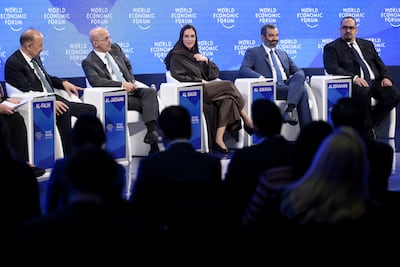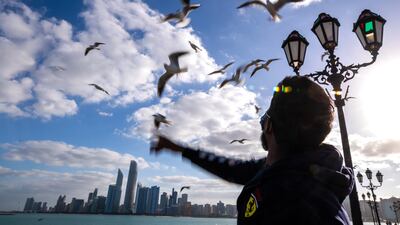Last month, the World Economic Forum’s (WEF) Annual Meeting was held in person after a gap of two years. The highly anticipated event, which had been put on hold due to restrictions resulting from the pandemic, brought together business leaders from around the globe. I was honoured to attend in capacity as executive chairman of Investcorp.
One of the highlights of this year’s forum was visiting the pavilion hosted by Saudi Crown Prince Mohammed bin Salman’s foundation (Misk), or the Youth Majlis. It was truly inspiring to witness distinguished Saudi men and women showcase their talents internationally and engage in conversations pertaining to the growth and prosperity of their country, as well as delving into discussions with their peers from around the globe.
Davos gave me the opportunity to join Saudi Arabia's Finance Minister, Mohammed Al Jadaan, Bahrain's Finance Minister, Sheikh Salman bin Khalifa Al Khalifa, and Alain Bejjani, chief executive of Majid Al Futtaim, on a panel about the economic outlook for the Mena region. It was a great honour to take the podium with these respected leaders who are at the helm of change during these challenging times, and to join hands with them and share an accurate and nuanced view of our region with the world and what lies ahead.
I was pleased to share my insights that were based on Investcorp’s forecasts as a private asset management firm that operates on a global scale.
Global inflation rates were a common concern and I noted that, while we cannot ignore them, GCC countries are not as severely affected, with rates forecasted to reach 3 per cent in 2022, compared to 7 per cent in the US, 5.3 per cent in Germany and 5.6 per cent in India.
There is no doubt that the global economy is growing more and more complex, but Mena countries are positioned to play an increasingly important role in the world’s post-pandemic recovery.
While oil prices are rising and are certainly a source of confidence for the region, the most promising indicators are the long-term visions and economic reform programmes that have been launched by GCC governments over the past few decades. These initiatives have given rise to diversified interests, positioned countries and cities in the region as global business hubs and allowed private sector firms growth channels like never before.
We cannot overlook the risks – food security is a major one, as is climate change – just like the rest of the world. However, GCC governments and the private sectors are working hand-in-hand, and still hold advantages at the macro level.
The region is gaining greater interest from foreign investors, continually sharpening its use of technologies and positioning itself to develop as a new centre of gravity for trade, investment and technology.
With macro trends on our side, the region has a major competitive advantage in the global arena. For instance, soft and hard infrastructure for investment is consistently maturing, setting the stage for future investments and growth opportunities.
Climate change is undoubtedly a major concern, like anywhere else in the world, but we have seen myriad projects take life in the region, sowing the seeds for a widespread transition to sustainable energy in the longer term. The region’s geographical position allows access to a wealth of solar energy, and nations have begun to reap the benefits of this valuable resource with plans under way for further expansion in coming years.
Governments and private sector firms are aware that, given they are operating in relatively new states, it is important to collaborate towards a common vision. Although there is always room for more harmony between both sides, there are plenty of projects that engage public and private sectors towards synergistic outcomes.
What is especially remarkable about GCC governments is their ability to adapt quickly and be as collaborative as possible in their operations. It is a reflection of the values we have carried for centuries, and a modern manifestation of a cohesive community in which citizens and authorities co-operate towards the greater good. This is a great way to instil a sense of responsibility in the wider population, especially younger citizens who will carry their nations forward.
Capital markets are often seen as fuel for private sector growth, and there were concerns at WEF regarding the recent crash on Wall Street and its repercussions in other parts of the world.

As far as Gulf markets are concerned, we cannot deny the implications of global events, however the region must hold a clear agenda.
The region has witnessed impressive growth rates over the past few years, most notably since governments have allowed complete foreign ownership. Capital markets have raised $40 billion in capital raised through IPOs on the GCC markets since 2019, and demand for IPOs is rising consistently.
That said, there is plenty of room to grow. I believe efforts should be under way for the region to take a lead in technology-driven financial instruments so that we can take the lead in regulating virtual assets, leading to more interest from foreign investors.
WEF’s Annual Meeting brought forth a series of interesting conversations, and it was a welcome reminder of the complexities that come with operating in an increasingly globalised environment. Diverse perspectives are always useful and can give rise to myriad new ideas and avenues for collaboration.
As nations around the globe navigate their ways through various stages of post-pandemic recovery, it is important to keep an open mind and focus on being as risk-averse as possible while working towards our goals.
The GCC region has ways to go, no doubt, but we hold the advantage of macro trends. We must navigate through the next phase with both confidence and caution, keep our eyes on the prize and make the most of any opportunities that contribute to national and regional growth.


